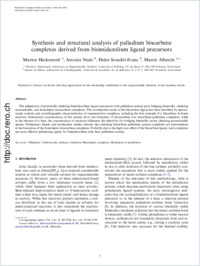Synthesis and structural analysis of palladium biscarbene complexes derived from bisimidazolium ligand precursors
- Heckenroth, Marion Chemistry Department, Laboratory of Organometallic Synthesis, University of Fribourg, Switzerland
- Neels, Antonia Institut de Chimie, Laboratoire de Cristallographie, Université de Neuchâtel, Switzerland
- Stoeckli-Evans, Helen Institut de Chimie, Laboratoire de Cristallographie, Université de Neuchâtel, Switzerland
- Albrecht, Martin Chemistry Department, Laboratory of Organometallic Synthesis, University of Fribourg, Switzerland
-
27.12.2005
Published in:
- Inorganica Chimica Acta. - 2006, vol. 359, no. 6, p. 1929-1938
English
The palladation of potentially chelating bisimidazolium ligand precursors with palladium acetate gives bridging bimetallic, chelating monometallic, and homoleptic tetracarbene complexes. The coordination mode of the biscarbene ligand has been identified by spectroscopic analysis and crystallographic characterization of representative complexes, including the first example of a biscarbene A-frame structure. Substantial concentrations of free acetate favor the formation of tetracarbene over biscarbene palladium complexes, while in the absence of a base, the concentration of reactants influences the selectivity for bridging bimetallic versus chelating monometallic species. Preliminary kinetic and mechanistic studies indicate that chelating biscarbene palladium acetate complexes are intermediates in the formation of the homoleptic tetracarbene complexes. Probably due to the high trans effect of the biscarbene ligand, such complexes are more efficient palladating agents for bisimidazolium salts than palladium acetate.
- Faculty
- Faculté des sciences et de médecine
- Department
- Département de Chimie
- Language
-
- English
- Classification
- Biological sciences
- License
- License undefined
- Identifiers
-
- RERO DOC 5939
- DOI 10.1016/j.ica.2005.10.045
- Persistent URL
- https://folia.unifr.ch/unifr/documents/300103
Statistics
Document views: 106
File downloads:
- albrecht_ssa.pdf: 195
